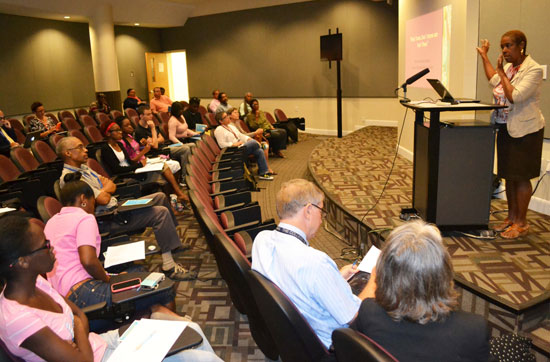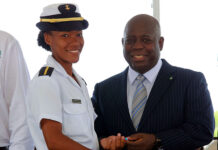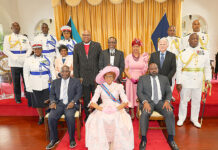
Girls are more likely than boys to be aggressive in their intimate relationships with the opposite sex, according to new research published in the International Journal of Bahamian Studies (IJBS) Volume 20(1), The College of The Bahamas’ online research journal.
The groundbreaking study gives insight into how teenagers view their roles in relationships with significant others and is based on the results of a survey more than 1,000 10th and 12th grade students in eight schools in New Providence completed. The College of The Bahamas and the Bahamas Crisis Centre collaborated on the research.
More than half of the boys surveyed (51.6%) indicated that their significant other had called them names and almost a third (28.1%) reported that their girlfriends had been physically abusive by hitting or slapping them. Twenty-eight percent of the males reported that they had also been pushed or shoved in their relationships.
Some of the students surveyed – between 15 and 18 years old – indicated that men should discipline their female partners. Fifty-eight percent of the males and 32 percent of the females responded in the affirmative to this question. Forty-six percent of the males and 16 percent of the females also responded that a wife must have sex with her spouse whenever he wants to. A woman who dresses too sexy deserves to be hit by her partner, the results of the research showed. Sixteen percent of the males and seven percent of the females responded affirmatively to this question.
This study was designed to investigate the perspectives of teenagers in The Bahamas on interpersonal relationships and the prevalence of violence experienced in relationships, particularly those of a romantic nature. It was based on a questionnaire that the Health Information Unit of the Ministry of Health helped the Bahamas Crisis Centre to develop. The Bahamas Crisis Centre administered the questionnaire in 2011.
“Unhealthy relationships, violence in relationships has almost become the norm now and if this is happening in the adult population, it also spills over into teen relationships and we were involved in a lot of interventions with teenagers who were experiencing violence in their relationships,” said Donna Nicolls, Bahamas Crisis Centre senior volunteer and trainer, who presented the research findings at the launch of the latest volume of the research journal on Friday.
She added that children as young as those in the fourth grade have been exhibiting violent behaviour.
In an attempt to curb aggressive and violent behaviour, the Bahamas Crisis Centre has launched the campaign “What Teens Don’t Know Can Hurt Them”. Advocates have been attempting to reinforce key messages: healthy relationships are possible and achievable and help is available. Research, like this newest study, is instrumental in informing social and public policies that address violence.
Researchers said the findings show that participation in aggressive and controlling behaviours by teens points to the need to educate students about how to develop more respectful relationships. Earlier research has found that teen dating violence is a preventable public health problem and that dating violence typically starts at school, therefore making interventions at this stage is important. Appropriate training during school years can promote healthy relationships with their attendant long-term benefits.
“The study indicates that teenagers expect males to be the controlling partners in adult relationships, and that women should conform to the stereotype of a housewife. Interventions at school can be useful in attempting to alter teenage relationships so that peer-on-peer abuse is reduced. However, culturally sensitive training can only be implemented once there is an understanding of the nature of these relationships, and of the expectations of teenagers for their adult relationships,” the research article reports.
Volume 20 of the IJBS is the seventh consecutively published edition of the research journal and the 2014 edition marks the fifth year that it has been peer reviewed. There are four original papers in Volume 20: two by scholars at The College of The Bahamas and two by researchers in the United States. It also includes four other types of scholarly work: a revision of a previously published paper, a conference presentation, a scholarly bibliography and a music CD review.
The research journal is an online Open Access journal indexed by Google, Google Scholar, the Directory of Open Access Journals and is included in commercial databases such as EBSCO. Several articles have been accessed more than 10,000 times.
The 20th edition also includes original research titled: “Invasion from the South: Social Construction of the Haitian ‘Other’ in The Bahamas”, “The Economic Impact of Junkanoo in The Bahamas” and “Identification of the Microbial Population Found in Water Sources in and around San Salvador Island, Bahamas”.
To read the International Journal of Bahamian Studies Volume 20 (1) visit:







